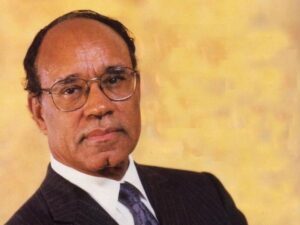Join the Cancer History Project for a discussion of the evolution of the health equity movement: A Black History Month panel Feb. 23 at 7 p.m.
In a 14:1 vote, ODAC nixes a PD-1 drug developed in China; data not generalizable to U.S. population
The FDA Oncologic Drugs Advisory Committee expressed decisive support for the agency’s view that data from trials of checkpoint inhibitors performed in mainland China aren’t applicable to the U.S. population.
On Feb. 1, as President Joe Biden was preparing to fire up the Cancer Moonshot, Eric Lander was the scientist in charge of mission control.
Harold Freeman had big plans after he finished his residency at Memorial Sloan Kettering Cancer Center in 1968. He planned to cut cancer out of Harlem.
On Jan. 24, 2022, the world lost a pioneer in bone marrow transplantation—now more-commonly referred to as hematopoietic cell transplantation. William Vaughan, MD, MBA, will always be known for his kindness, his approachability, and his unwavering commitment to improving patient safety and outcomes.
The Cancer History Project’s podcast will provide a collection of oral histories and interviews with the people who have shaped oncology as we know it.
Since COVID-19 made its way to the United States, we have seen a stream of worrying news of the pandemic’s impact on cancer care in the U.S., including 9.4 million missed screenings for just about all forms of cancer. While screening rates rebounded in the fall of 2020, there’s a growing concern from oncologists that screenings haven’t returned to pre-pandemic levels for everyone.
FDA is preparing to review an estimated 25 applications for cancer drugs that are being developed based largely—and in many cases entirely—on data from mainland China.
The White House has announced an expansion of the Cancer Moonshot’s mission beyond its initial focus on accelerating research and data sharing in oncology—with promises of renewed funding for an array of ambitious presidential initiatives.
On behalf of the millions of Americans with cancer, whose very lives depend on our nation’s investment in oncology research, we ask that you join us now in urging congressional lawmakers to do the right thing: pass robust funding for the National Institutes of Health and the National Cancer Institute.















